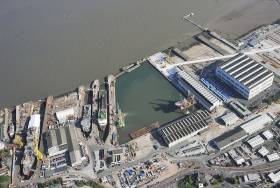Displaying items by tag: Type 31e frigates
#Ports&Shipping- Three shipbuilding teams in the UK, according to a Ministry of Defence statement, have been awarded multi-million-pound contracts to push ahead with plans to build five new Type 31e warships for the Royal Navy.
The announcement from the British Defence Minister Stuart Andrew took place in Portsmouth Naval Base last week on board HMS Diamond, (see sister, Defender's recent Irish visit) which returned from the Mediterranean.
The Minister revealed that teams led by BAE Systems, (see Merseyside yard Cammell Laird) Babcock and Atlas Elektronik UK have been shortlisted for the competition to build the five frigates for £1.25 billion.
Each group has been awarded a contract worth up to £5 million to fund the next stage of their plans, with the preferred bidder for the design and manufacture of the ships due to be announced by the end of next year. The MOD want the first ship delivered in 2023.
Speaking in Portsmouth, Defence Minister Stuart Andrew said: “This is the first frigate competition the UK has run in a generation, and we are funding three shipbuilding teams with extremely exciting concepts to continue developing their plans. Next year we will announce the winning bidder, and one of these designs will go on to bolster our future fleet with five new ships, creating UK jobs and ensuring our Royal Navy maintains a truly global presence in an increasingly uncertain world.”
The awarding of the contracts is a key milestone in the National Shipbuilding Strategy, which was launched in September 2017. The Strategy met the challenges set by an independent report written by Sir John Parker, a figure with a wealth of leadership and boardroom experience in shipbuilding, and was underpinned by the commitment to build the new Type 31e ships.
The bold Type 31e programme will move through procurement at an unprecedented pace: the vessel will commence production within 3 years of the launch of the programme, far quicker than similar programmes of this type.
The ships will make up the next generation of the Royal Navy fleet, along with eight Type 26 warships which will start being delivered from the mid-2020s. The names of all eight Type 26 frigates have now been announced, and the Defence Secretary Gavin Williamson has also outlined that they will be homed in Devonport.
The decision on where the Type 31e frigates will be based is still to be made.






























































